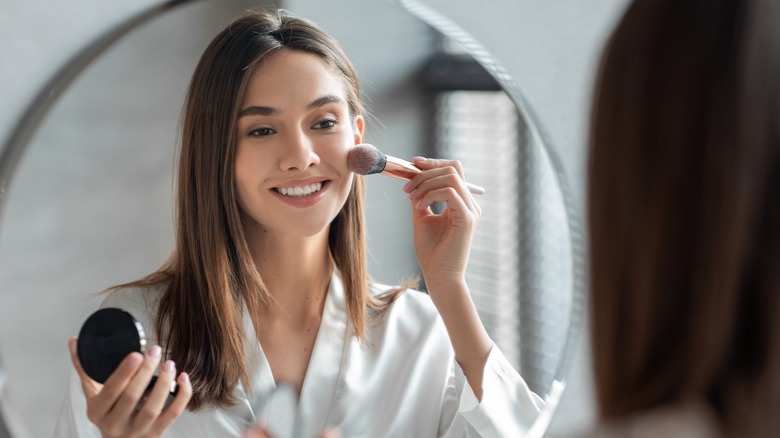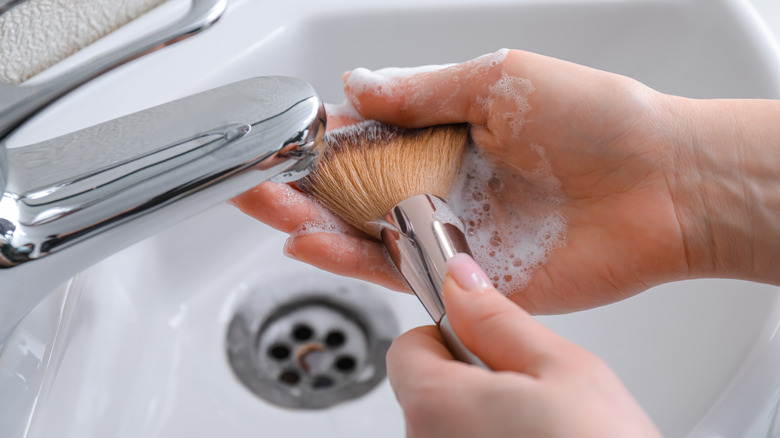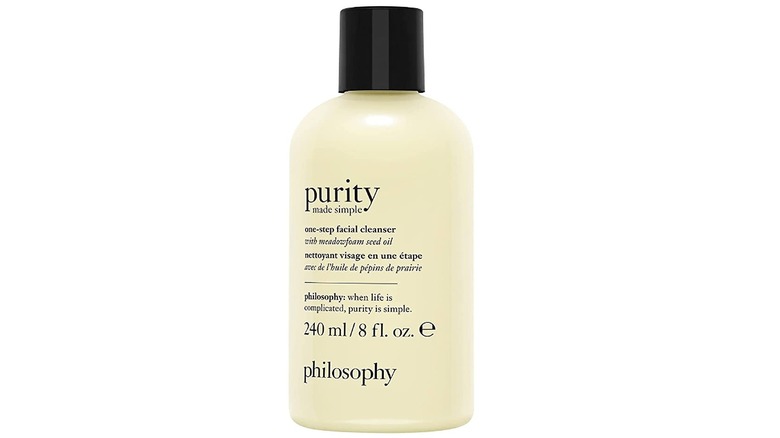Why You Shouldn't Be Lazy About Cleaning Your Makeup Brushes
We may receive a commission on purchases made from links.
When it comes to cleaning, our to-do lists are long. We have to clean our bathrooms and kitchens, make our beds, do our laundry, and even clean things like our cars and appliances. So when it comes to cleaning smaller things, we often find excuses to avoid doing it. When it comes to personal hygiene, we know that not brushing our teeth can lead to many issues, including things you wouldn't imagine, like bone loss and heart disease. We also know that washing our face, especially the right way, is vital to ensuring our skin looks healthy and breakout-free.
But beyond our skin, there is something lingering on our bathroom counters that we may not pay enough attention to — the bacteria on our makeup brushes. Whether you have been dabbling in the same tinted moisturizer for years or are using multiple foundations and products to achieve these TikTok makeup trends, your brushes, beauty blenders, and powder puffs need to be cleaned regularly — here's why.
How often you need to clean those makeup brushes
Being lazy about cleaning our makeup brushes makes sense. We often remember to do it when we need the tool, causing us to put it off repeatedly. But not cleaning those brushes can be super gross. In fact, according to the Journal of Applied Microbiology, your brushes likely have a ton of bacteria like E.Coli and fungus just hanging out, ready to be spread on your face. In addition to breakouts and acne, bacteria can cause serious infections. Even beyond those infections, not cleaning your brushes can lead to poor makeup application, damage to the brushes, and even wrinkles.
Luckily, you don't have to start washing your brushes after each use. The American Academy of Dermatology Association recommends washing them about every seven to ten days to avoid bacteria buildup. But cleaning your makeup brushes isn't as simple as running them under tap water and waiting for them to dry.
How to properly clean makeup brushes
The American Academy of Dermatology Association has laid out a seven-step process for thoroughly cleaning your makeup brushes. And while this may sound like a long cleaning regime, it's worth it to avoid the harmful bacteria from leaving those brushes and entering your pores. Always start by rinsing the tips of the brush. This allows all current residue to disappear before cleaning the entirety of the brush. You'll then want to fill a bowl of water and cleaning solution and swirl your brush, using your palm to get deep into the bristles. Once the water starts to run clear, you can dry your brushes by squeezing out the water and then laying them flat on the counter to dry.
But you can't just wash your brushes with any soap or cleanser. Something too harsh could damage the brush, while something too gentle may not eliminate all the bacteria. This Philosophy cleanser has been touted as the best facial cleanser on the market, but it works double duty as an awesome brush cleaner. We also love this Blendercleanser for our beauty blenders and this Clinique Makeup Brush Cleanser, which is great for buildup and long-term residue.


